We are proud to say that these posts are not sponsored. Our editorial team of Bobbie moms and writers personally select each featured product. If you buy something through our links, we may earn an affiliate commission, at no cost to you.
If you’re a new mom, chances are, you’ve been taking prenatal vitamins for a long time—like maybe even a year or longer. And, if so, good for you! In fact, the American College of Gynecology (ACOG) recommends women start taking a prenatal vitamin at least 1 month, but ideally three months, prior to getting pregnant. This is to ensure that you’re getting your fair share of key nutrients that help facilitate a healthy pregnancy for you and baby. So what exactly are prenatal vitamins and why are they so important before, during and after pregnancy?
- 14 Best prenatal vitamins
- What are prenatal vitamins?
- Can you take prenatal vitamins without being pregnant?
- Prenatal vitamins for pregnancy
- Prenatal vitamins with folic acid
- Should women take prenatal vitamins while breastfeeding?
- What nutrients do prenatal vitamins contain?
- Which is the best prenatal vitamin?
- Prenatal vitamins with choline
- Can you take prenatal vitamins in gummy form?
- Tips for taking your prenatal vitamin
- Best time to take prenatal vitamins
14 Best prenatal vitamins
The best prenatal vitamins are those that have vitamins D, A, C, B12, and E, thiamine, riboflavin, niacin, zinc, iodine and folic acid. The below brands are just a few of the most common prenatal vitamin brands available on the market. Food scientist Taylor Wallace, Ph.D., C.F.S., F.A.C.N recommends opting for recognized national brands vs. random products online and to read the ingredient labels carefully.
1. Natalist Prenatal Daily Packets
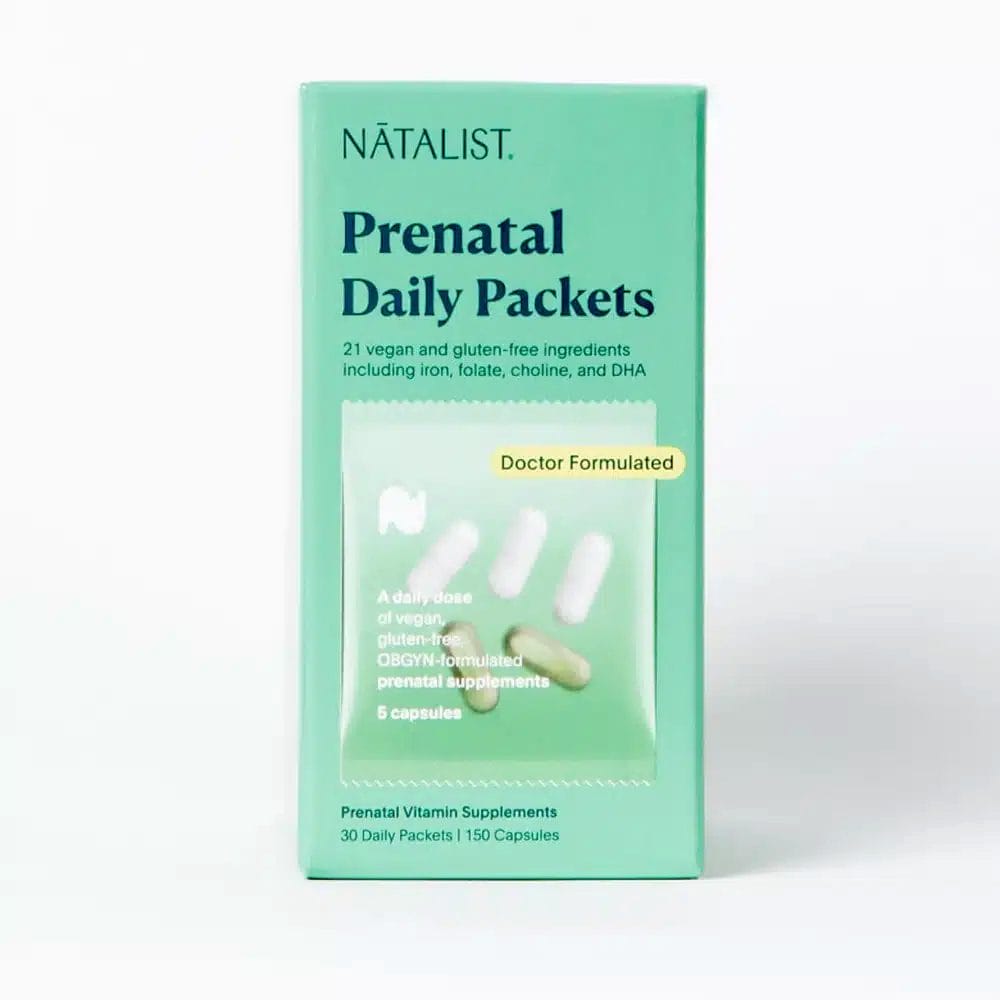
These vegan and gluten-free daily packets include everything you need in prenatal supplements. They’re free from milk, eggs, fish, crustacean, tree nuts, soybean, peanuts, wheat yeast, gluten, corn, sodium, sugar, starch, artificial coloring, preservatives, or flavoring. Natalist is also 100% plastic neutral and made in the USA.
2. New Chapter Advanced Perfect Prenatal Vitamins
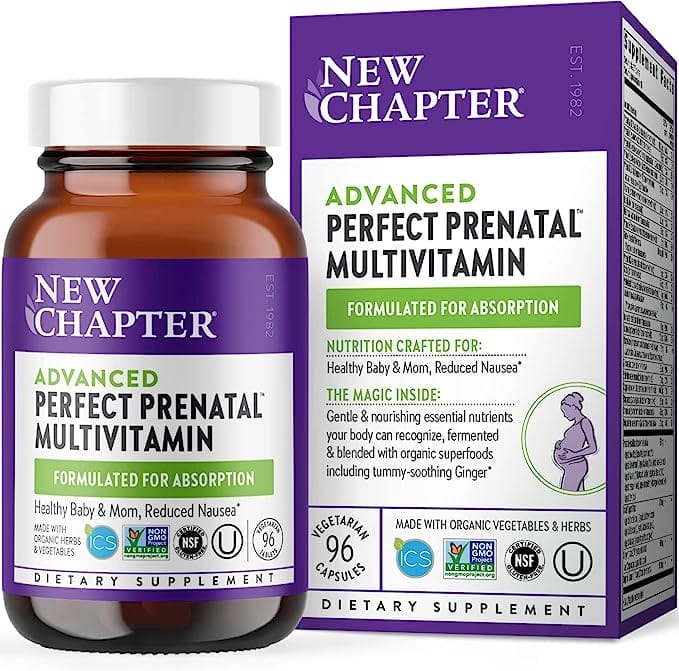
The Advanced Perfect Prenatal Multivitamin from New Chapter is a great option if you are suffering from nausea in your first trimester (and beyond). They were formulated with ginger to help ease upset stomachs, and made with other organic vegetables and herbs. These vitamins have great reviews on Amazon, and you can even get a subscription to save money and have them sent to your door.
3. Perelel Prenatal Vitamin Packs
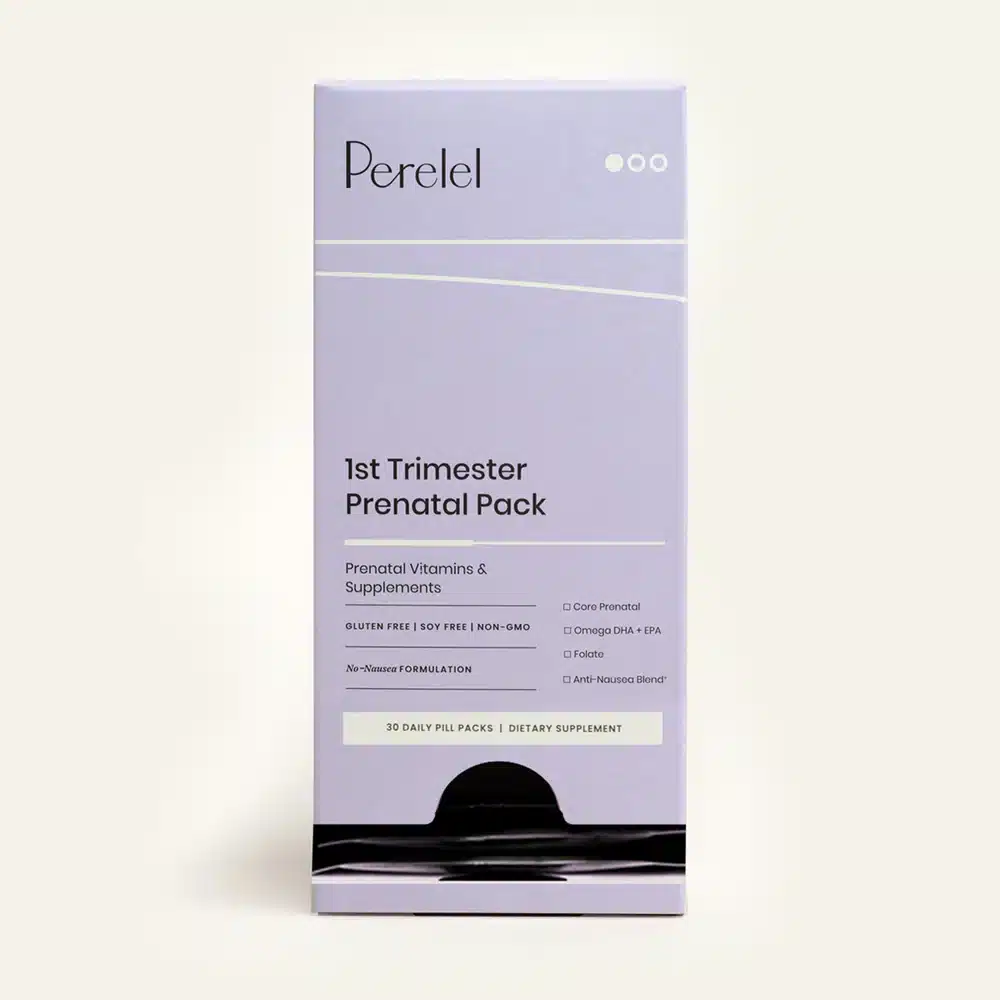
Perelel has you covered from conception to recovery and beyond with their convenient prenatal vitamin packs. They have different packs to support your conception journey, each trimester, and recovery with various supplements targeted for each stage in your journey. These vitamin packs also have a great subscribe and save option for convenience and some serious savings.
4. Ritual Prenatal Vitamins
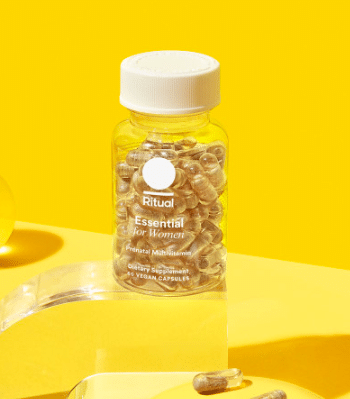
Ritual prenatal multivitamins are a great prenatal option before and during your pregnancy. Because it’s a multivitamin, just one capsule holds everything you and your baby need. You can choose from either citrus or mint essence to keep things fresh each day.
5. Ritual Natal Choline
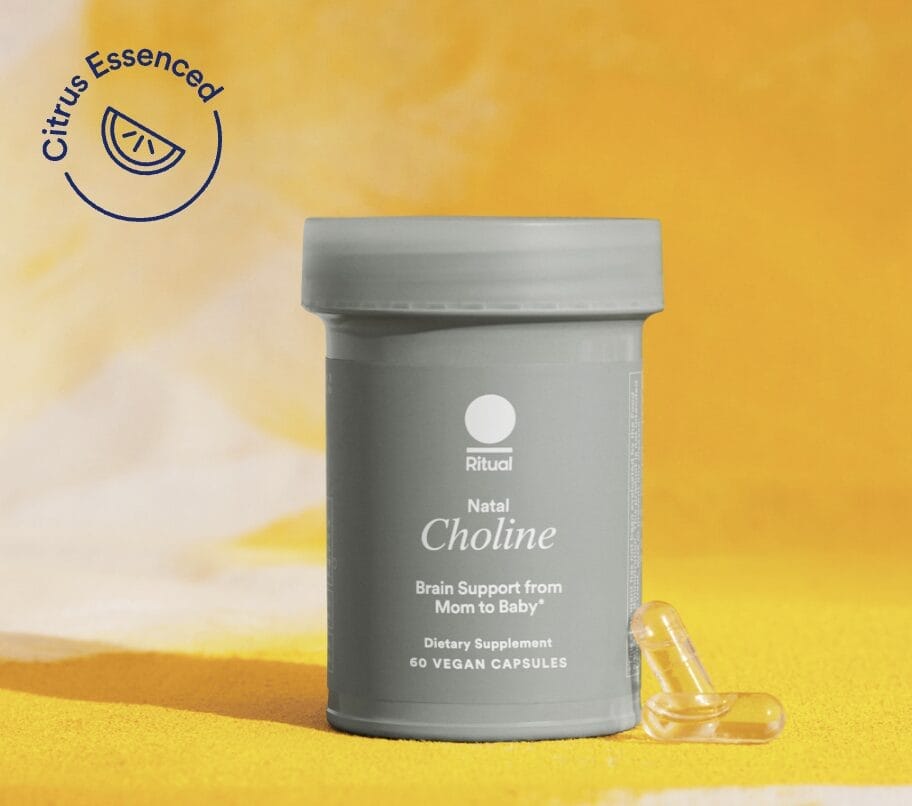
Ritual’s newest addition to the prenatal lineup is their Choline supplement. Choline supports a baby’s cognitive function from infancy through early childhood when taken during pregnancy. This is a great addition to take alongside your current prenatal or postnatal multivitamin.
Dr Wallace fully supports choline for pregnant and breastfeeding moms. He adds that only 8% of pregnant women and 10% of all Americans are getting adequate amounts of choline in their diets. So…add to cart!
6. Nature Made Prenatal Gummies with Folic Acid + DHA + Choline
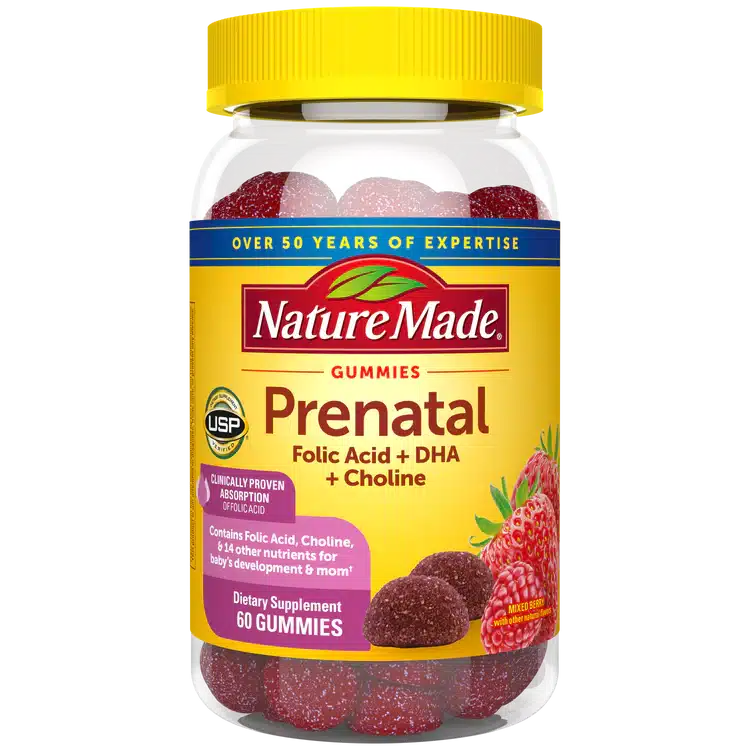
If gummy vitamins are your thing, this is a great choice for a prenatal! Take 2 of these gummies a day for everything you and your growing baby needs, including choline for brain and spinal cord development! Nature Made also has a great subscribe and save option!
7. Olly Essential Prenatal Vitamins
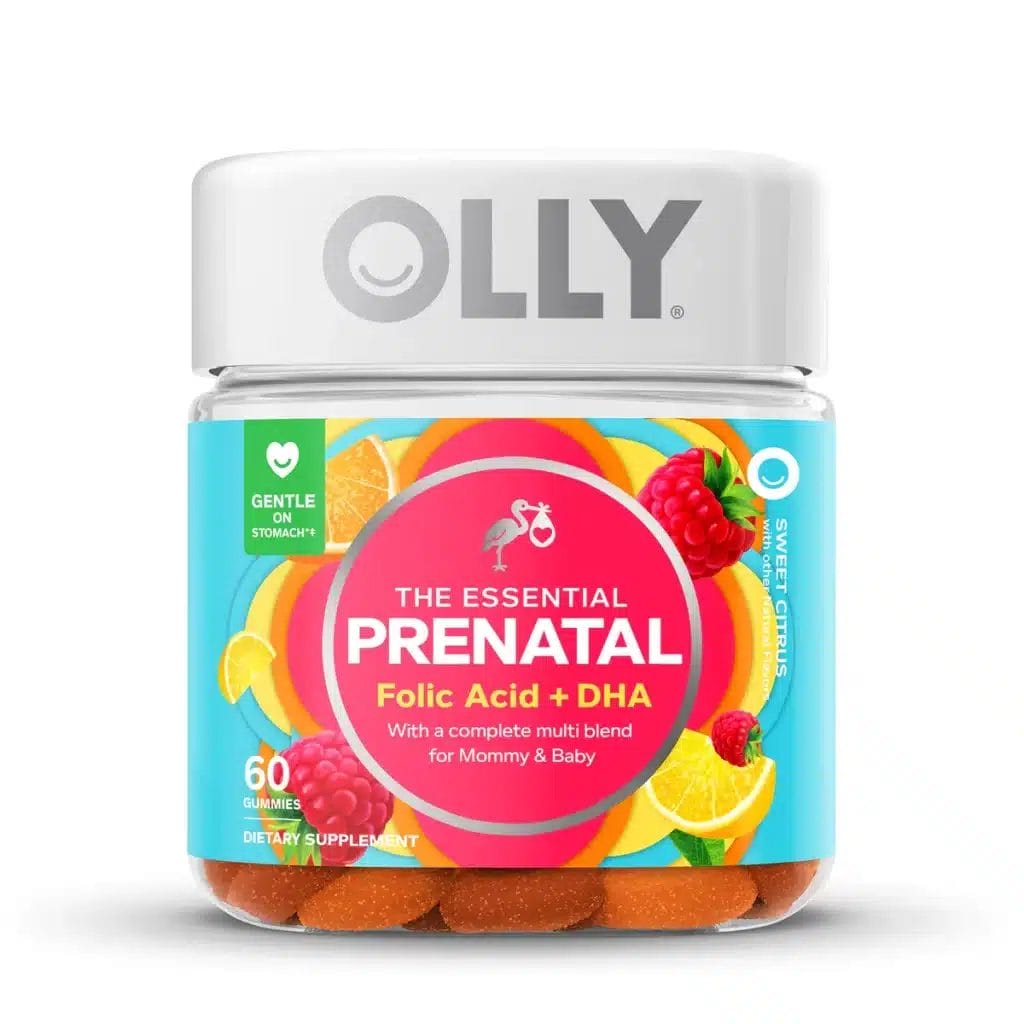
These delicious gummy vitamins come in berry and citrus flavors while also nourishing you and baby with folic acid and DHA. You can find Olly prenatal vitamins at various pharmacies, or you could subscribe and save 15%. They’re yummy and affordable!
8. One A Day Prenatal 1 Complete Multi-Vitamins

One A Day vitamins are a classic tried and true for many! Their prenatal complete multivitamin contains key nutrients necessary for you and your baby. The softgels are gluten free and contain no artificial sweeteners or high fructose corn syrup.
9. SmartyPants Prenatal Formula Gummy Vitamins

Another great gummy multivitamin option. The Smarty Pants prenatal is non-GMO. Free of milk, eggs, peanuts, tree nut allergens, fish allergens, shellfish, soy, gluten and wheat. They also contain no synthetic colors or artificial sweeteners/flavors.
10. Spring Valley Prenatal Vitamins
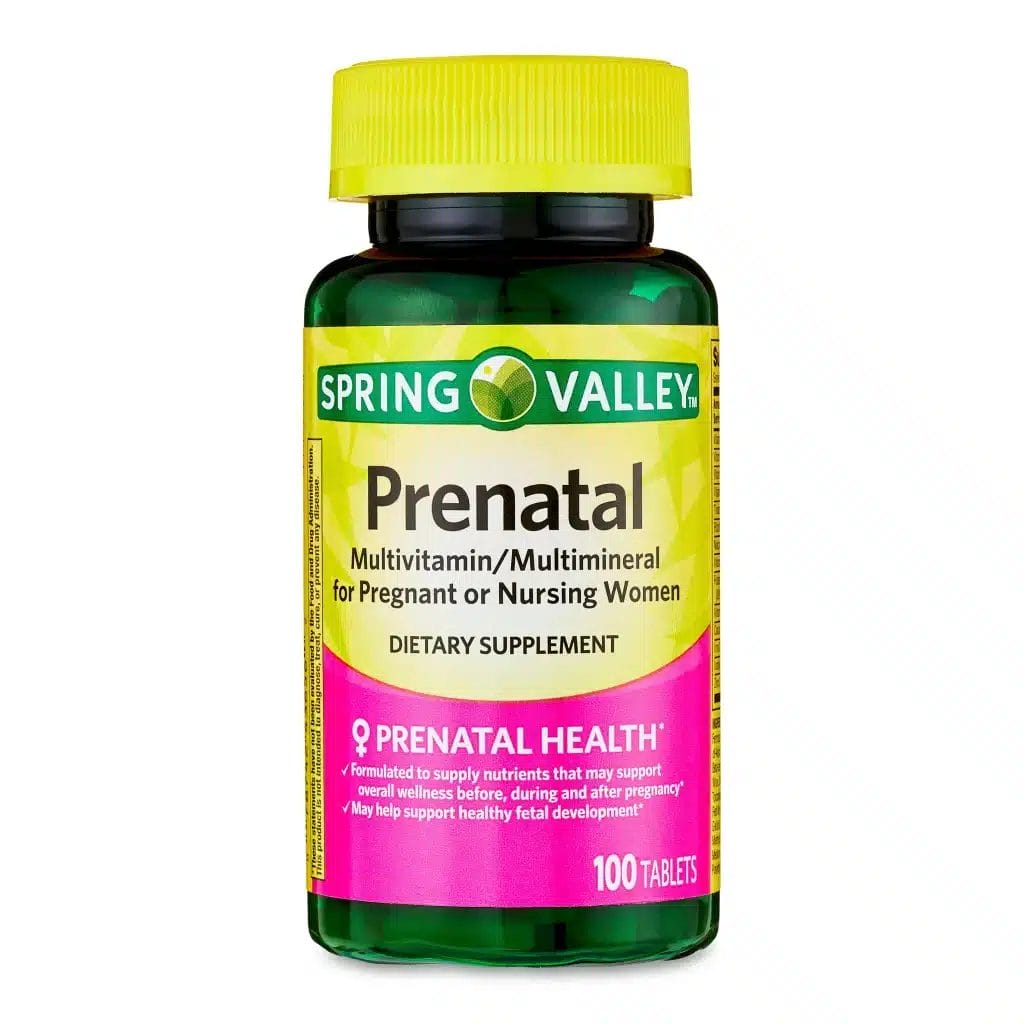
Spring Valley prenatal vitamins are a great option for both pregnancy and nursing. They’re super affordable, especially because you only need to take one tablet each day. They contain no gluten, lactose, or artificial flavors.
11. Garden of Life Prenatal Vitamins
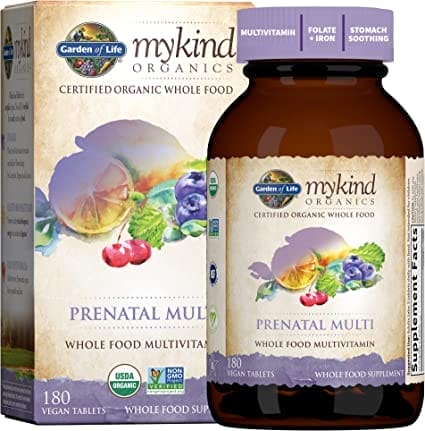
These prenatal multivitamins are made with over 30 organic fruits, veggies and herbs to provide what you and your baby need. They also include a blend of ginger, peppermint, lemon and tomato to help soothe your upset stomach from morning sickness. They are Certified USDA Organic, Non-GMO Project Verified, Vegan, NSF Gluten-Free and Kosher, meaning almost everyone can take them!
12. GNC Women’s Prenatal Vitamins
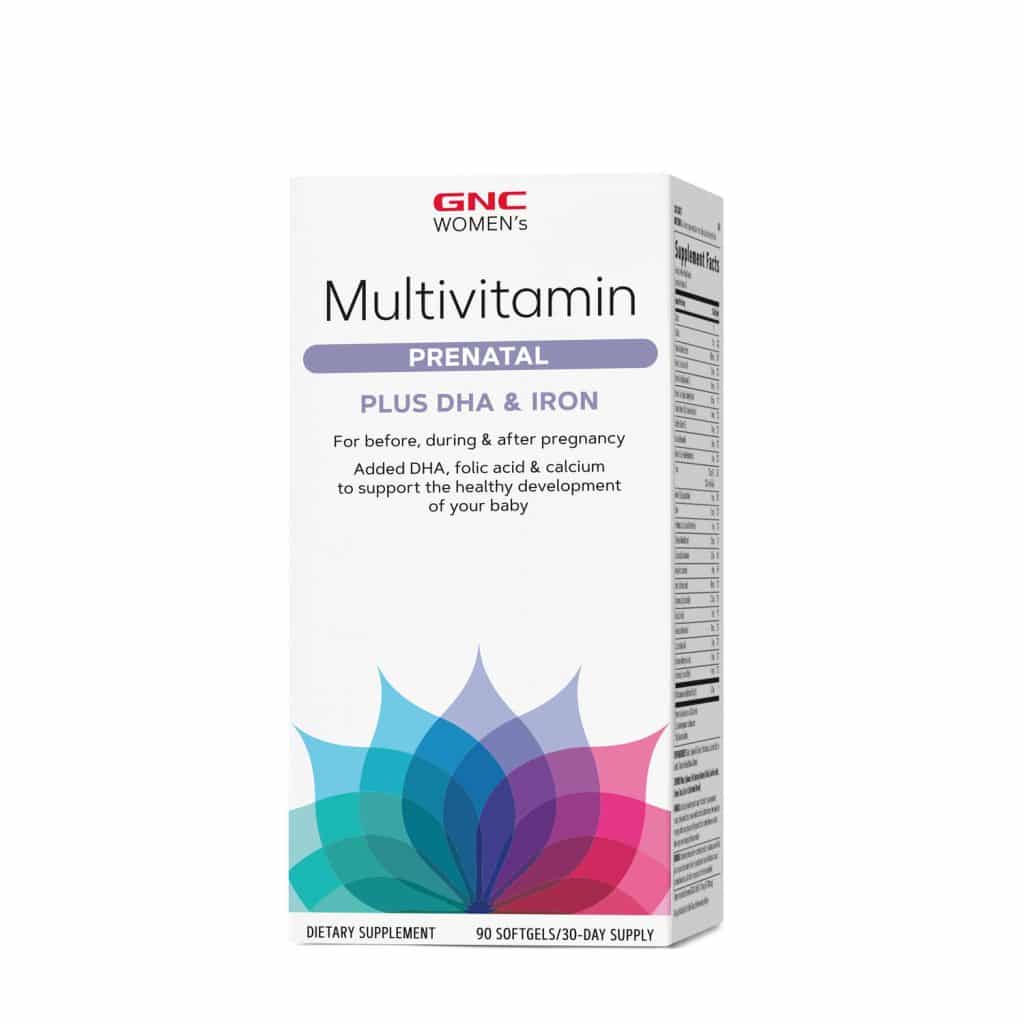
The GNC prenatal multivitamin nourishes you and your baby before, during, and even after pregnancy. This multivitamin also includes iron in order to support your increased blood volume during your pregnancy. Through the GNC website, you can subscribe and save 10% and free shipping!
13. Thorne Basic Prenatal Vitamins
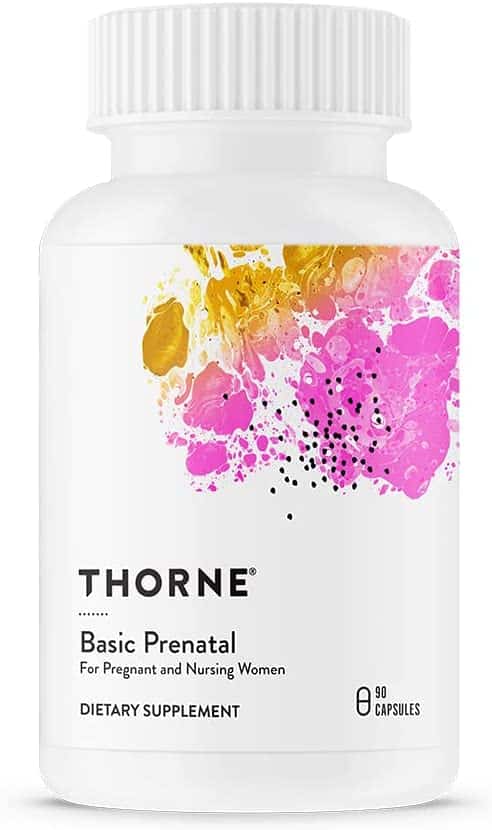
Thorne collaborates with the Mayo Clinic on wellness research, and ensures that the best goes into their basic prenatal multivitamin. It’s formulated to be gentle on your stomach with vitamins C, B6, and K to help soothe your morning sickness. Thorne calls this prenatal “basic”, because it only contains everything you and your baby need with no additives.
14. Needed Prenatal Multi Vitamin
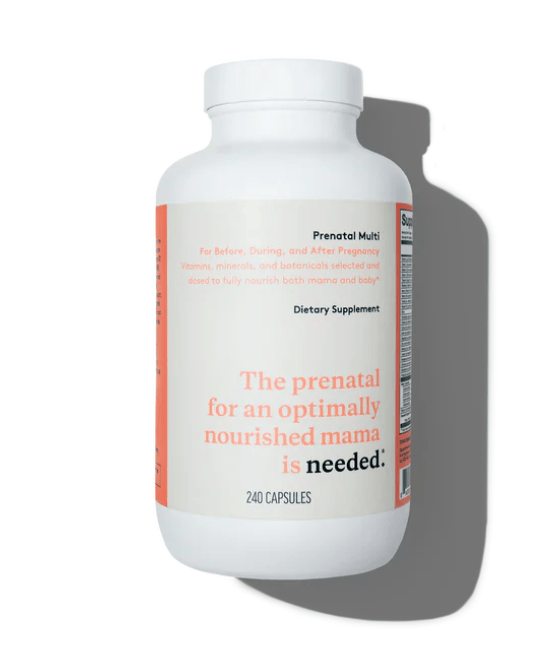
Needed formulated their Prenatal Multi in collaboration with perinatal practitioners, using data from testing thousands of mamas’ nutrient levels to support women to thrive. Their Prenatal Multi capsule includes 24 vitamins and minerals in optimal forms and dosages that moms need. They offer it for before, during, after pregnancy— and even beyond.
What are prenatal vitamins?
Put simply, prenatal vitamins are certain supplements that are formulated with all the vitamins and minerals that pregnant women need before, during and after pregnancy. “Think of prenatal vitamins as a nutrition insurance plan for yourself and the baby, even if you have a good diet,” says Dr. Wallace. “Don’t wait to get pregnant before starting to take a prenatal vitamin.
Can you take prenatal vitamins without being pregnant?
If you’re a planner, you can start on prenatals once you’re thinking of getting pregnant (talk to your doctor about when is best). Even with the recommendation to start on them three months prior to pregnancy, we know that most pregnancies aren’t planned (51%), so it’s understandable if you don’t start your prenatals until you see those two lines staring back at you on that pregnancy test. What matters most is that you start taking a prenatal as soon as you do find out that you’re expecting, and continue to do so for the rest of your pregnancy and beyond, if you are nursing.
Prenatal vitamins for pregnancy
If you’re wondering what all the fuss is about when it comes to prenatal vitamins—or what’s actually in them that makes them so important—you’re in good company. When it comes to pregnancy, many moms are instructed to follow certain rules without questioning a thing. It’s totally normal to want to understand everything there is to know about, well, everything. Here, we’re offering you a refresher course on prenatal vitamins, because we think it’s important that you’re in the know.
Prenatal vitamins with folic acid
“One of the most important aspects of taking a vitamin in the preconception phase is to make sure you have sufficient folate, as this helps to prevent neural tube defects,” says Jane Van Dis, MD, OB/GYN, and Bobbie medical advisor. “Additionally, important vitamins and minerals to look for are iron (to help with red blood cell formation), vitamin D3 and calcium (for bone health), choline (to help with brain and spinal cord formation), along with vitamins A, C, B6 and B12.
Should women take prenatal vitamins while breastfeeding?
Dr Wallace says YES! Often the body strips a woman’s body to nourish the infant, so again, it’s good to have a nutrition insurance plan. And if a breastfeeding woman is pregnant again, he still says yes—absolutely— the rules don’t change. She should take the prenatals while breastfeeding and throughout.
What nutrients do prenatal vitamins contain?
Most prenatal vitamins are formulated with many of the same vitamins and minerals that you will find in a standard multivitamin—vitamins D, C, A, B12, and E, thiamine, riboflavin, niacin, zinc, iodine, sometimes iron and always folic acid, which has been linked to a reduction in major birth defects such as anencephaly and spina bifida, according to the Centers for Disease Control and Prevention (CDC).
It’s worth pointing out, however, that, like most things in life, not all prenatal vitamins are created equal. “Prenatal vitamins brands vary in their vitamin and mineral composition and quantities, and there are, unfortunately, no government standards for what a prenatal vitamin must contain,” warns Dr. Wallace. For this reason, he urges expecting parents to be savvy consumers.
Which is the best prenatal vitamin?
The most important thing you can do is choose a prenatal vitamin with 100 percent of the Daily Value (DV) of folic acid to decrease the risk of neural tube defects in the baby Dr. Wallace explains. “Most neural tube defects occur during the first month of pregnancy, so again, don’t just start taking a prenatal vitamin once you have become pregnant,” he says. He recommends starting the regimen at least one month prior to becoming pregnant.
Unfortunately, many prenatal vitamins are formulated without the inclusion of iron, a key nutrient that helps your body create blood to supply oxygen to the baby. What’s more: An estimated 40 percent of all pregnant women are iron deficient at the start of their pregnancy, according to recent research published in the Oman Medical Journal, which is even more of an incentive for pregnant women to ensure they’re supplementing with this all-important nutrient.
Prenatal vitamins with choline
Choline is an important nutrient that’s not always found in prenatal vitamins, according to Dr. Wallace. “American Medical Association (AMA) recommends prenatal supplementation with choline, however this can be a bulky nutrient and most prenatal vitamins do not contain sufficient amounts so taking a separate choline supplement can help meet the recommendation. The same can be said for calcium, magnesium, and the omega-3 fatty acids DHA and EPA.
Can you take prenatal vitamins in gummy form?
According to Dr Wallace, gummy vitamins typically contain fewer nutrients, so it’s easier to miss something important. Plus, many have added sugars. Pill form is ideal since it can fit more of the essentials.
Tips for taking your prenatal vitamin
Considering you might not be feeling 100 percent (or even close to it) during pregnancy—especially in those first few months—knowing when and how to take your prenatal vitamin can make a world of a difference.
First things first: Dr. Wallace recommends taking your prenatal vitamin with food to avoid any stomach upset that can occur with larger doses of iron and zinc. “Consuming supplements with food allows for the gradual absorption of nutrients, which is likely healthier for you and minimizes risk of stomach upset,” he says. “If you’re taking multiple supplements make sure to pass that by your MD or Registered Dietitian Nutritionist (RDN) to ensure you aren’t getting too much.”
Best time to take prenatal vitamins
You might also want to take your prenatal vitamin at nighttime so that it’s easier on your stomach. Not only will you likely have food and water in your belly, but you will also be lying down in bed so you don’t have to worry about movement making you queasy. So long as those nutrients are being absorbed by your body, it doesn’t matter what time of day you consume them.
Try a few different brands. Sometimes it can take trial and error to find the right prenatal vitamin for you. Luckily, there are no shortage of brands out there on the market, many of which offer quality nutrients.


